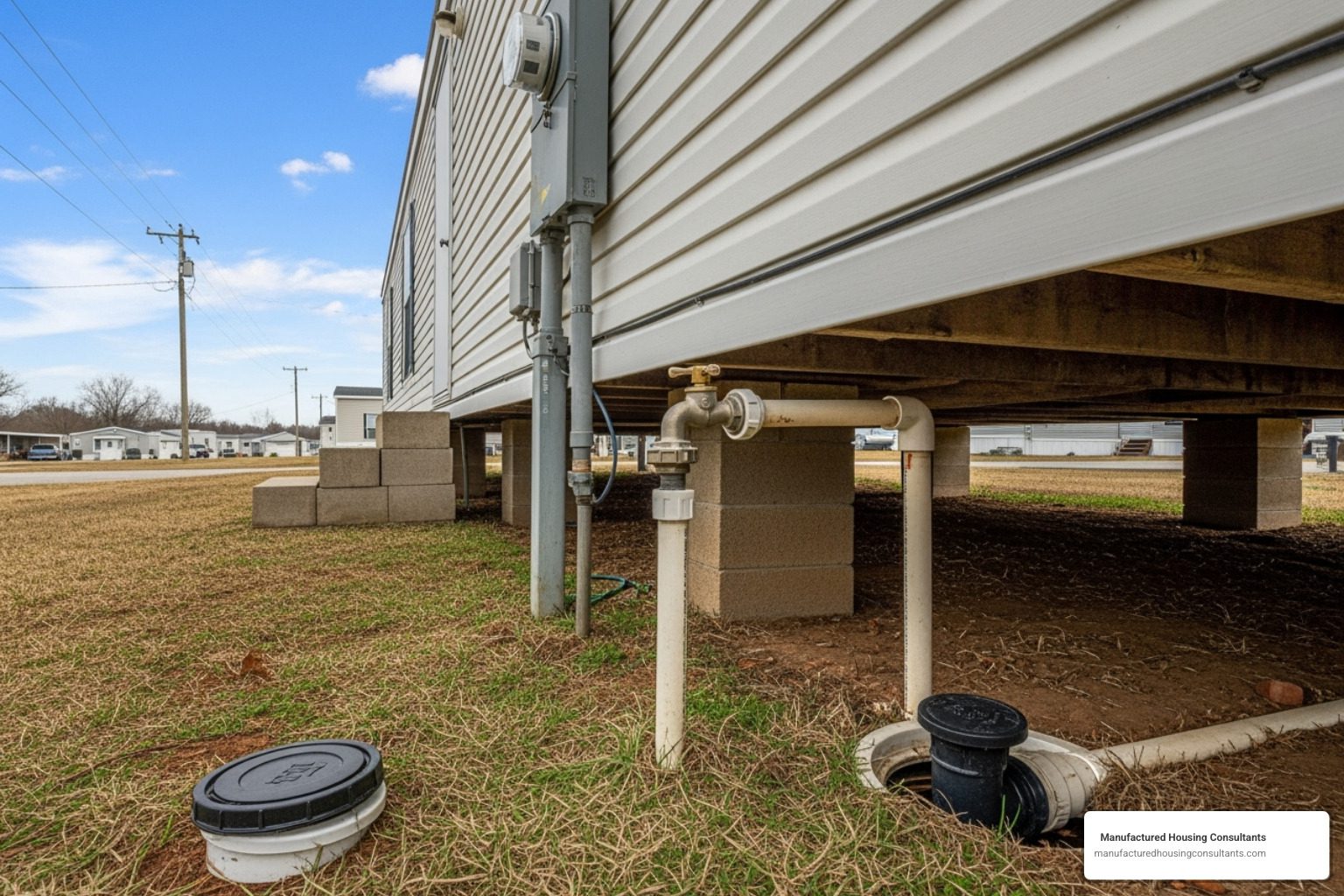Understanding Mobile Home Utility Hookups: Your Essential Starting Point
Mobile home utility hookup is the process of connecting your manufactured home to essential services. For Texas families, understanding this process from the start can save thousands of dollars and prevent serious safety issues. The biggest factor influencing cost and complexity is your location.
Key Connections & Typical Texas Costs:
- Electrical Service: 4-wire system (100 or 200 amp).
- Water Supply: Municipal connection or private well.
- Sewer/Septic: City sewer or a septic system.
- Gas: Natural gas or propane line (if applicable).
Cost Estimates:
- Mobile Home Park: $500 – $2,000 (infrastructure exists).
- Undeveloped Private Land: $8,000 – $40,000 (new infrastructure needed).
Setting up in a park is straightforward, but placing a home on private land requires permits, licensed professionals, and significant investment. This guide will help you steer the process, whether you’re in San Antonio, New Braunfels, or anywhere in Texas.
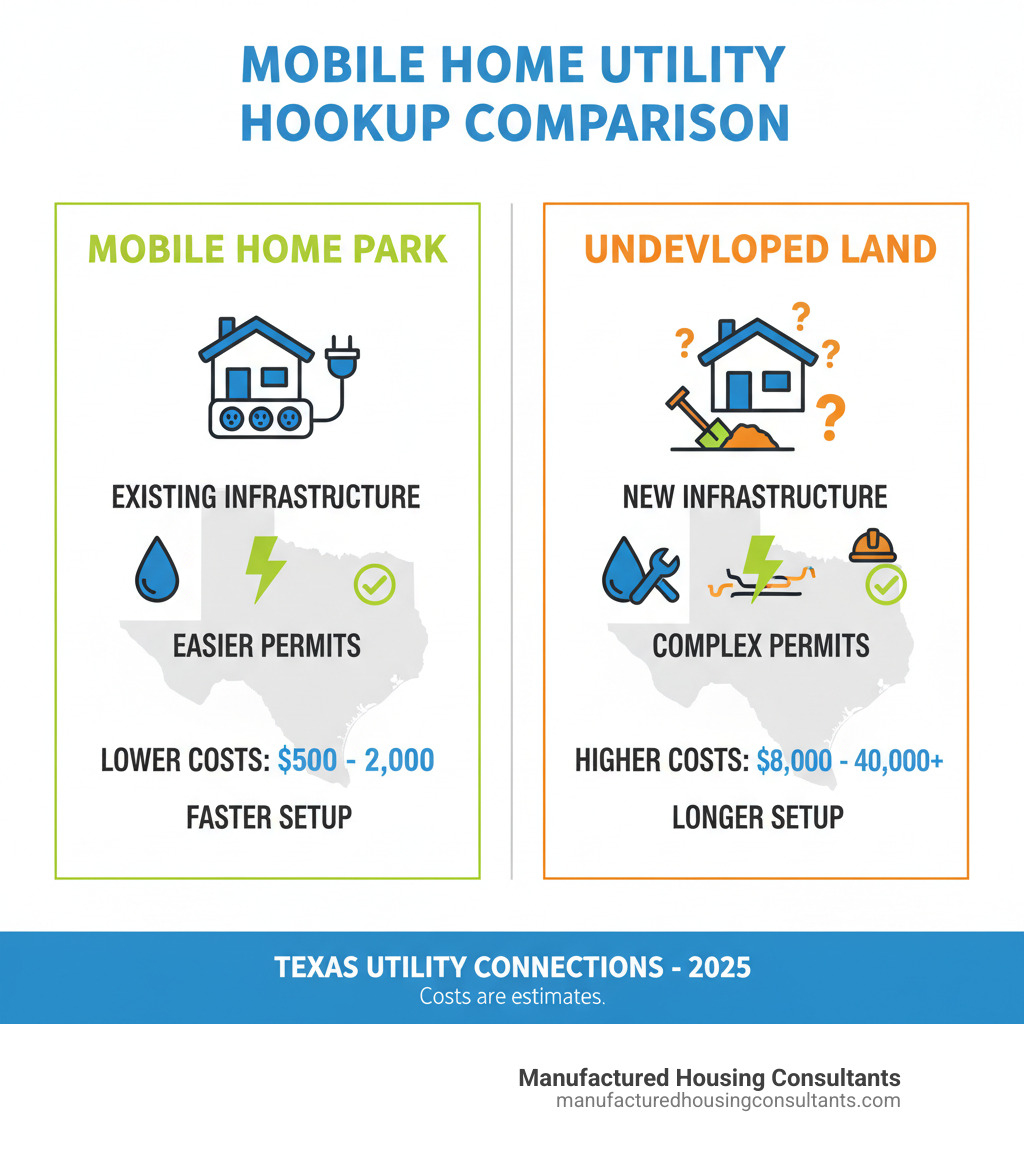
Manufactured Housing Consultants has helped hundreds of Texas families with utility hookups. We’ll guide you through connecting your home safely and affordably.
Your Complete Guide to the Mobile Home Utility Hookup Process in Texas
Connecting electricity, water, gas, and sewer requires careful planning and professional help. The first and most important decision is where to place your home, as this determines the entire scope of your mobile home utility hookup project.
First Steps: Mobile Home Park vs. Private Land
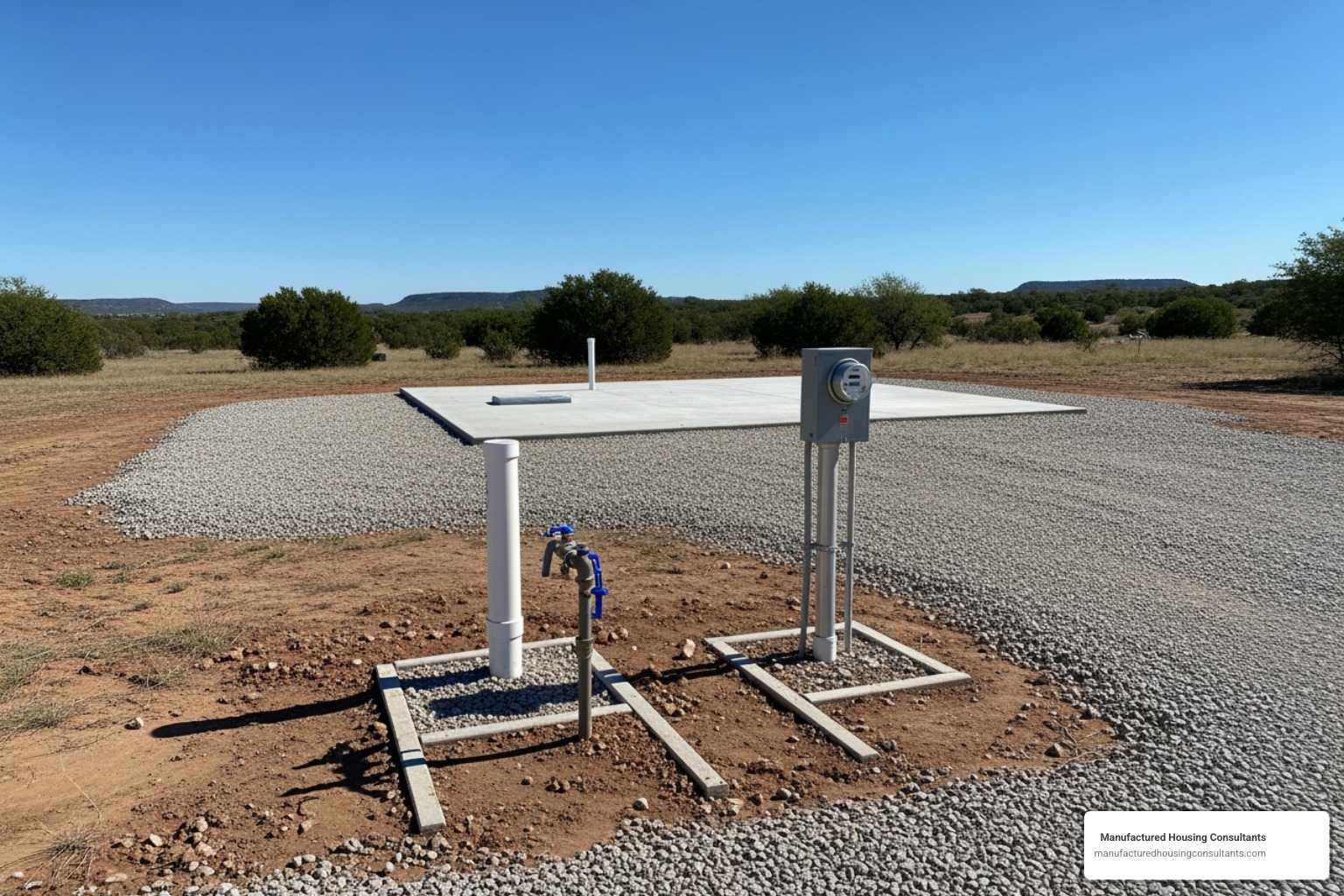
The Mobile Home Park Advantage
Choosing a mobile home park in a Texas community like San Antonio or Von Ormy simplifies the utility process immensely. Parks are designed for manufactured homes, meaning the heavy lifting is already done.
- Utilities are Ready: Water, electrical, gas, and sewer lines are run to each lot with connection points (“stubs”) waiting.
- Simpler Permitting: The park manages the main infrastructure, so you avoid extensive permit processes for basic connections.
- Faster Move-In: Hookups can often be completed in days, not weeks or months.
The Private Land Journey
Placing your home on private land offers freedom but requires significant planning and investment. You are responsible for building all utility infrastructure from scratch.
- Site Preparation: Land must be cleared, graded, and made accessible for utility crews. Our guide on site preparation explains this in detail.
- Utility Access: The distance from your property to existing utility grids is a major cost factor. Every foot of trenching adds to the budget.
- Complex Permitting: You’ll need separate permits for electrical, plumbing, and septic systems, each requiring applications, inspections, and coordination with local Texas authorities.
- Higher Costs: Setting up utilities on undeveloped land typically costs $8,000 to $40,000, depending on terrain, soil, and distance to main lines.
For more on this, see our guides on buying land for mobile homes (Part 1) and (Part 2).
Why You Need Professional Help
DIY utility hookups are dangerous and often illegal in Texas. Most counties require licensed professionals for electrical, plumbing, and gas work. A faulty connection can cause electrocution, gas leaks, or water contamination. Professionals charge $350-$600 per day, an investment that ensures safety, code compliance, and peace of mind. Manufactured Housing Consultants offers utility connection services to connect you with trusted Texas professionals.
Essential Electrical Service Requirements for Your Mobile Home
Manufactured home electrical systems have unique safety requirements. Getting this right is critical to prevent fire and shock hazards.
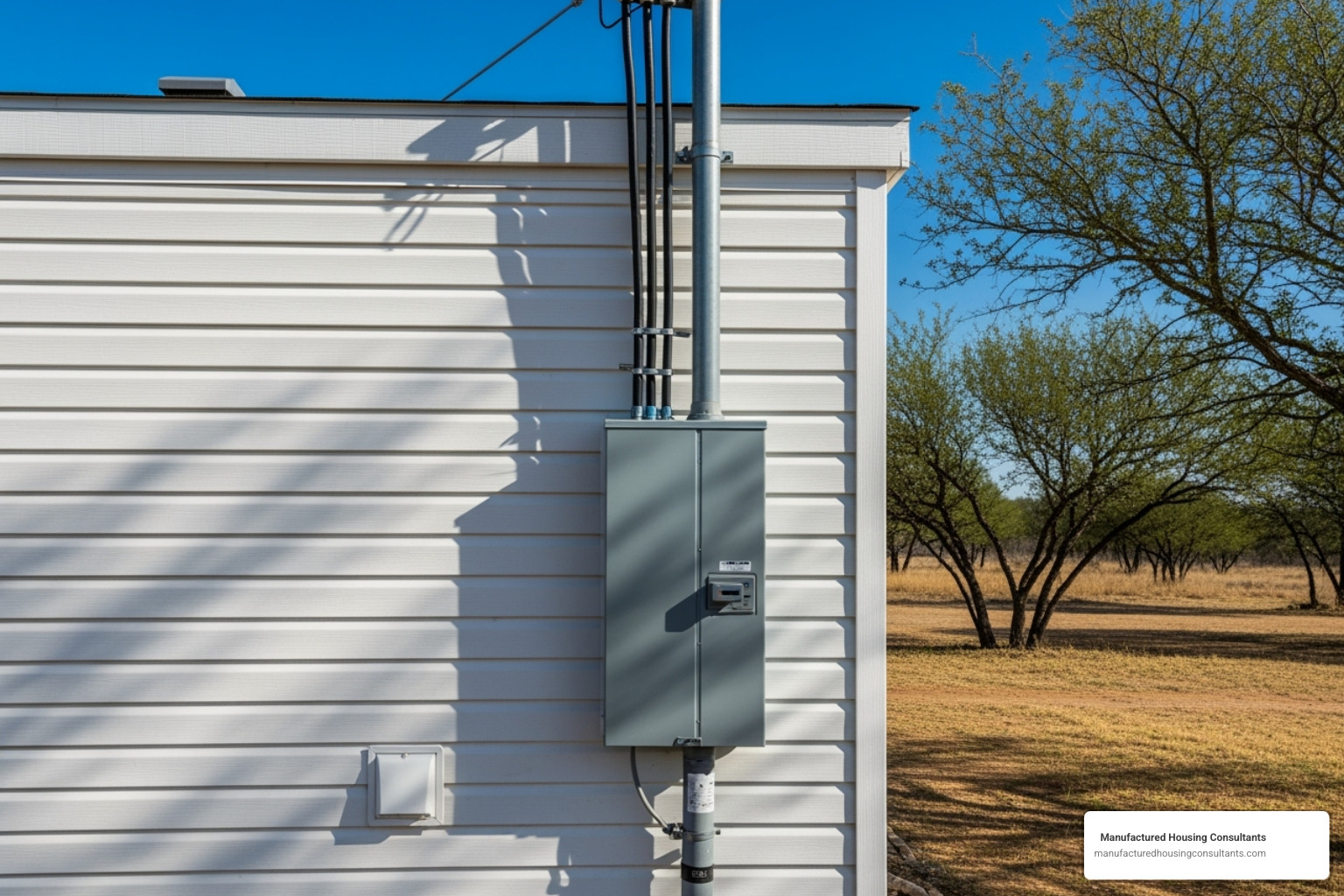
The Four-Wire System: A Mandated Safety Feature
Every manufactured home in Texas must have a four-wire electrical service, as required by the National Electric Code (NEC) Article 550. This system includes two hot wires, one neutral wire, and a separate grounding wire. The grounding wire provides a safe path for electricity during a fault, preventing the home’s metal frame from becoming energized.
Electrical Capacity and Critical Safety
- Amperage: Your home’s HUD label, usually near the main panel, specifies its electrical capacity—typically 100-amp or 200-amp service. 200-amp service is better for homes with multiple large appliances.
- Neutral-Ground Separation: This is the most critical safety rule for a mobile home utility hookup. The neutral and ground bars inside your home’s panel must be separate. They are only bonded together at the main service disconnect outside. Improper bonding creates a severe electrocution risk, as it can energize the home’s metal chassis and plumbing.
Adding new circuits also requires adherence to strict codes and should only be done by a licensed electrician who understands manufactured homes. At Manufactured Housing Consultants, our electrical utility connection services ensure your home is wired safely and to Texas code.
Water, Sewer, and Gas Connections: What Texas Homeowners Need to Know
Properly connecting water, sewer, and gas lines is essential for health and safety. Your location dictates the methods and costs.
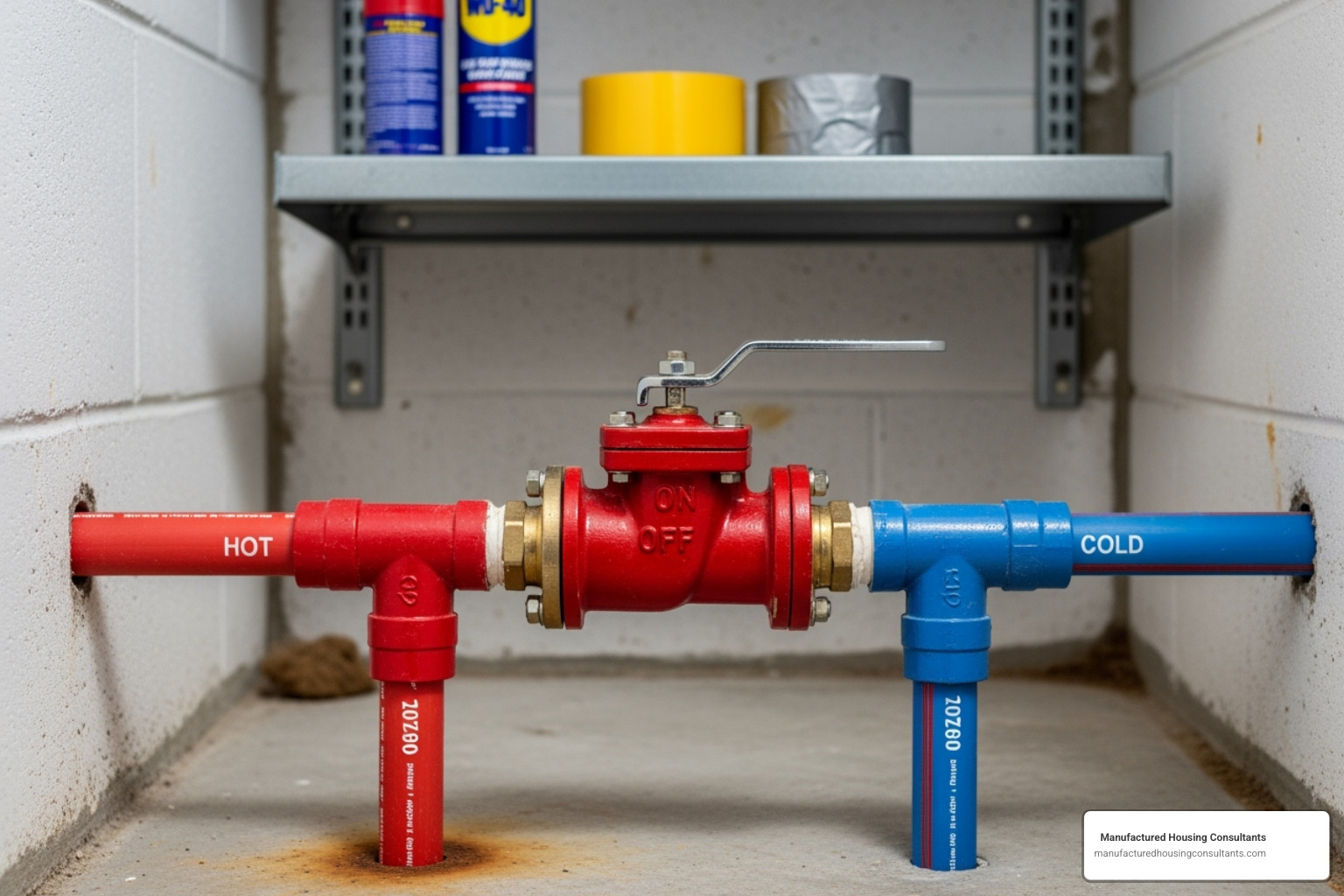
Water Supply
- Municipal Water: If available, a licensed plumber connects a line from the city meter to your home.
- Private Well: On rural Texas land, you’ll likely need to drill a well, which involves a pump, pressure tank, and water quality testing.
- Main Shut-Off Valve: Immediately locate your main water shut-off valve. It’s typically found near the water heater, behind an access panel, or under the home where the water line enters. Knowing its location is crucial in an emergency.
Wastewater Disposal
- City Sewer: A plumber connects your home’s waste lines to the municipal sewer system.
- Septic System: On private land, a septic system is usually required. This involves a percolation (“perc”) test to ensure the soil can absorb wastewater, followed by a permitted installation of a tank and drain field. Our modular home foundation guide touches on these connections.
Gas Lines
- Natural Gas vs. Propane: If available, a licensed gas plumber connects to the natural gas main. In rural areas, a propane tank is installed on your property.
- Safety First: All gas connections require pressure testing to check for leaks. This is a non-negotiable safety step and is never a DIY job.
Utilities run in the same trench must maintain minimum separation distances (e.g., 12 inches between electrical and water lines) as required by local Texas codes. Our water, sewer, and gas connection services coordinate these installations with qualified professionals.
The Mobile Home Utility Hookup Process: Permits, Professionals, and Common Issues
Navigating permits and avoiding common pitfalls are key to a smooth utility setup. Manufactured homes have specific requirements due to their factory construction and metal frames, making professional expertise essential.
Permits and Professionals
On private land in Texas, you will need separate permits for electrical, plumbing, and gas work from your local building department. Utility companies also have their own requirements. Licensed professionals are invaluable here; they know local codes and can help manage the permitting process.
While DIY may seem cheaper, the risks are immense. Improper electrical work can cause electrocution, faulty gas lines can lead to explosions, and plumbing errors can cause contamination. Most Texas counties legally require licensed professionals. The cost of hiring a pro is an investment in safety, reliability, and your home’s resale value, as unpermitted work can kill a future sale.
Moving and Reconnecting
If you move your home, utilities must be professionally disconnected and capped. At the new Texas location, the reconnection process is similar to a new installation, requiring licensed professionals and new inspections before service can be activated.
Working with professionals through our utility connection services helps you avoid common issues like leaky pipes, improper grounding, and overloaded circuits from the start.
Key Differences for Single-Wide vs. Double-Wide Homes
The size of your home affects the complexity of your mobile home utility hookup.
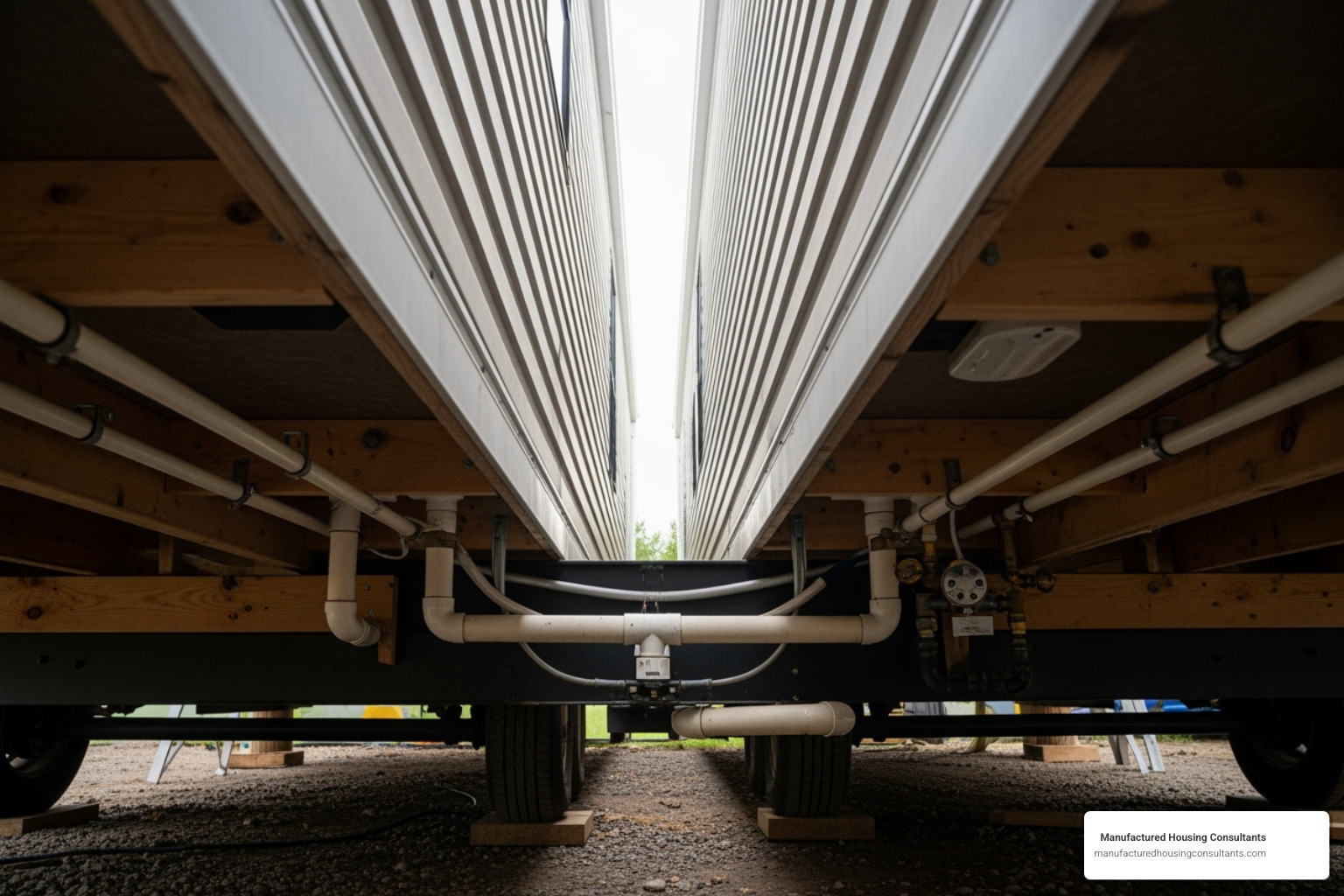
Single-Wide: Straightforward Connections
A single-wide home arrives as one unit with all utility connections grouped in a central area. This simplifies trenching and hookup, making the process faster and generally less expensive.
Double-Wide: The Marriage Line Challenge
Double-wides offer more space but are delivered in two sections that are joined on-site at the “marriage line.” This creates the challenge of crossover connections. Plumbing, electrical wiring, and HVAC ductwork must be connected between the two halves. This work is done on-site and requires precision to ensure there are no leaks or faults. The marriage line must also be perfectly sealed. This added complexity requires specialized experience and typically involves more labor than a single-wide installation. Our guide on the pros and cons of double-wide mobile homes provides more insight.
Finalizing Your Connections and Moving In
With the technical details covered, the final steps ensure your mobile home utility hookup is safe, compliant, and ready for you to move in. Don’t overlook these crucial last items.
Safety and Professional Installation
We can’t overstate the importance of safety. Improperly grounded electrical systems, leaky gas lines, or faulty plumbing are serious hazards. Hiring licensed professionals is not just about following Texas codes; it’s about protecting your family and your investment. Professional work comes with expertise, insurance, and warranties, safeguarding your home’s long-term value and preventing costly repairs.
Budget Realistically
Underestimating costs is a common mistake. A hookup in a mobile home park may cost $500-$2,000, but developing private land can range from $8,000 to $40,000 or more. Factors like trenching distance, soil conditions, and permit fees all impact the final price. We help you understand these costs upfront to avoid surprises.
The Final Inspection
Before your utilities are turned on, local Texas authorities will conduct final inspections of the electrical, plumbing, and septic/sewer work. Passing these inspections is your green light, confirming that everything is installed safely and to code.
We’re Here to Guide You
From our locations in San Antonio and Von Ormy, Manufactured Housing Consultants serves families throughout Texas. We don’t just sell homes; we guide you through the entire process, including the mobile home utility hookup. We connect you with trusted, licensed professionals in areas like New Braunfels and the Hill Country who understand manufactured homes.
Managing these costs can be challenging, which is why we offer flexible Financing Options to help make your dream home and its setup affordable.
Ready to get started? Get expert help with your Texas mobile home utility connections today! Our team is ready to ensure your new house becomes a safe, comfortable, and properly connected home.

